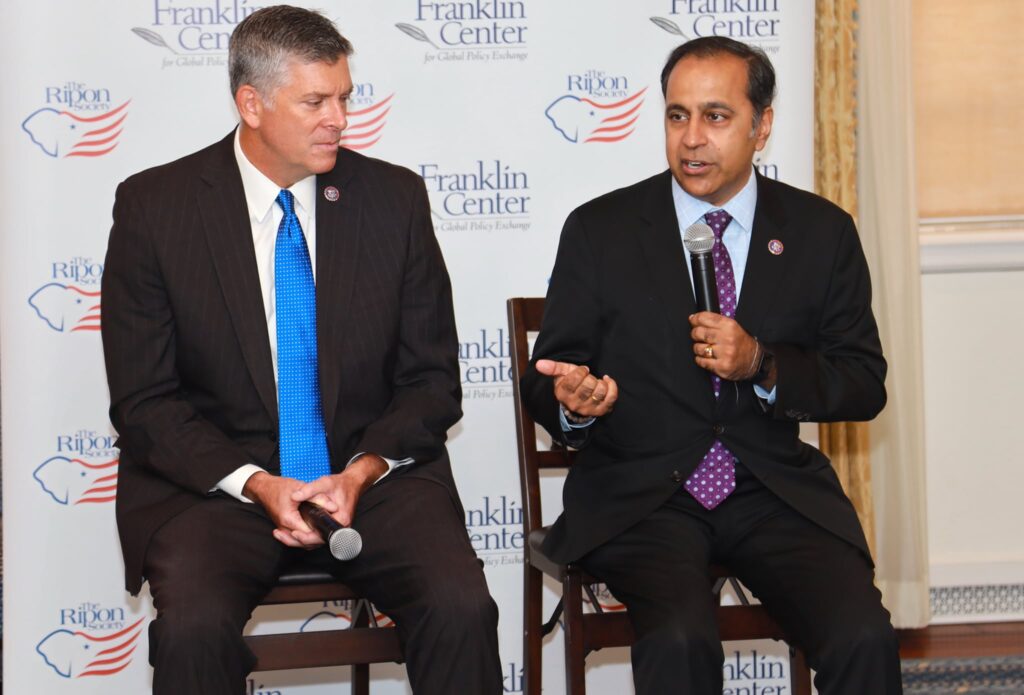
“They don’t respect anything but strength, and they think we’re weak.”
WASHINGTON, DC – Darin LaHood is a Republican who represents the 18thDistrict of Illinois in the U.S. House of Representatives. Raja Krishnamoorthi is a Democrat who represents Illinois’s 8th Congressional District. Together, they are working to bridge the partisan divide to not only meet the challenges facing the people they represent in their home state, but the challenge that America increasingly faces from the rise of China across the globe.
Both appeared this past Thursday before a breakfast meeting of The Ripon Society and Franklin Center for Global Policy Exchange to discuss their efforts in this regard and the relationship they have established over the past several years.
“We enjoy a great working relationship,” LaHood stated, kicking off the discussion. “Over the last five years, I think we’ve done five different bipartisan events together. Raja came to Peoria; we did a town hall meeting there. We went to Raja’s district and did an event at Allstate there. We went to John Marshall Law School and did an event there. We’ve been on the radio multiple times. We enjoy each other’s company and being together. We ride on the plane almost every week, back and forth with each other. I tell him I’m in his district twice a week because I’m at O’Hare Airport twice a week. But we have that friendship.”
“I recently got appointed to the Intelligence Committee in April, and to be there now with Raja has been a great experience. To see the men and women around the world that protect us every day is really fascinating. So it’s an honor and a privilege to be part of the Intelligence Committee and to work there and to work with Raja. And what’s refreshing and unique about the Intelligence Committee is, when you go in there, you have to keep your phones and all your electronics outside. So no one is distracted in there. No one’s playing to the cameras. You have a real dialogue and discussion, maybe what it was like 20 or 30 years ago in the Congress.”
“It’s been a great way to get to know Members on the other side and work on a lot of these issues. And as you know, we have many challenges around the globe, whether it’s Afghanistan, whether it’s terrorism, whether it’s China, and many other geopolitical issues.”
Krishnamoorthi echoed his colleague’s remarks.
“Darin has just been a tremendous partner on different initiatives, and he’s a friend,” the Illinois Democrat stated. “I think that it’s fair to say that we have developed kind of a common approach in certain ways because of our common roots. His father was also our congressman. His father’s boss, Bob Michel, was our congressman … And so, I just want to say, thank you, Darin, for all that you represent, in terms of your family and your values.”
Krishnamoorthi then touched on one area where he and LaHood have found common ground – closing the skills gap.
“That’s a big passion of mine and Darin’s,” he said. “We actually passed a law modernizing our nation’s skills-based education system. It turns out that only one-third of Americans have a four-year college degree, but two-thirds do not. And we can’t possibly get people access to the greatest social welfare program devised by human beings — a J.O.B. — unless we get them a high quality post-secondary education. And that can be skills-based education. And so we modernized that, Donald Trump signed it into law in 2018, and now 11 million people are getting a higher quality skills-based education.”
Following their opening remarks, LaHood and Krishnamoorthi took a number of questions about another challenge they are confronting as members of the Intelligence Committee – the rise of China, and whether they view the Asian power as a dangerous adversary or formidable competitor.
“There is no doubt that China is an existential threat,” LaHood stated bluntly. “But how do you balance that with a middle class of 600 million and the fact that we are so intertwined with them economically. Many — and many of my own party — would say we’ve got to go to a Cold War mentality with China. But China is not what Russia was 40 years ago in terms of how we are tied economically. How do you balance that? Particularly in the tech space and in the area of emerging technologies, China is blatantly violating rules and norms and laws. They don’t abide by the same rules and standards that every other industrialized country in the world has done.”
“What are the tools in our toolbox to get their attention and to change that? The last administration used a lot of tariffs to do that. We got into a trade war. I guess if we want to go to a Cold War mentality, then we’re going to have to go to the next step and decouple. I don’t necessarily think that’s the right approach. The middle ground, I think, is partnering with our like-minded allies. We just saw this with the deal with the Australians on the submarine. I think that’s a great move by the Biden Administration to enter into this agreement for the nuclear subs for Australia. But there are many other ways. Again, our European allies that have the same issues with China, particularly on the technology space and trade violations, we ought to be partnering with them.”
Krishnamoorthi struck a similar note.
“I view them as a dangerous competitor or some hybrid of that,” he stated. “I think that Darin is absolutely right that we can’t decouple from them as a trading partner. I mean, they buy most of Darin’s District’s soybeans and corn, or at least a lot of it, I think. Under the Trump trade regime, I think they’re buying more of it hopefully. But the main point is, I don’t think we can decouple from them.”
“We have to engage them economically, keeping in mind what they’re doing with regard to stealing our intellectual property and erecting safeguards to that here. But then we have to also show strength with regard to their aggressive military posture. There’s just no doubt about it — they don’t respect anything but strength, and they think we’re weak … They think that we don’t have the resolve to project strength in the Pacific, work with our partners on common military challenges, or even buck up our own democracy and work on issues like infrastructure to make sure that internally we are shoring up our weaknesses.”
“And so we have to play against type. That means with regard to the Indo-Pacific region, we have to help our quadrilateral partners — India, Australia, and Japan — in terms of maintaining a very robust security posture there. But we also have to exercise our soft power. That means — and I’m going to go off on an issue that I care deeply about — we have to lead the global vaccination program. Right now, we are going to higher levels of vaccination in this country, but much of the world is not vaccinated against COVID. China is going around pedaling this crappy vaccine they call Sinovac and saying that it’s going to be great for you. But it doesn’t work, and then they extract things in return.
“We should be the ones going around the world using our effective mRNA vaccines. I’ve put forward legislation called NOVID — it’s a play on words, “No More COVID.” It would establish a program just like George W. Bush did with PEPFAR for HIV AIDs in Africa — probably the most successful public health program in the world. It’s saved tens of millions of people. We’ve got to show that same resolve now and exercise our soft power. It has tremendous geopolitical benefits. At the same time, it will save the world and us.”
LaHood and Krishnamoorthi were also asked the Chinese government’s connection to the Chinese telecom company Huawei and what the U.S. response should be to the effort to deploy Chinese technology around the world.
“Last week, I took my first Intel trip to Djibouti,” LaHood said. “The Chinese have a port there that they built over the last five years that will end up holding 10,000 Chinese troops. They worked out an agreement with the Djiboutian government to have Huawei place cameras on light poles throughout the city. China now has a backdoor to it. They watch and they are surrounding our base there. It’s an example of what Huawei does. China goes in and sells Huawei as a way to monitor your population. But then they have a backdoor to it. That model is followed throughout Africa and other regions around the world. And that needs to be a wake-up call to what Huawei is up to …This issue is not going away. Huawei is persistent and they are aggressive.”
Krishnamoorthi concurred.
“I think we should be cultivating 5G competitors to Huawei among our allies, not just in the United States,” he stated. “Because quite frankly, we don’t have enough 5G incumbents within the United States.”
The Democratic lawmaker added that Congress approved – and the President enacted – legislation he authored in 2019 that would reverse this trend by encouraging the development of 5G technology in the U.S.
“We have to do more of that here,” he said. “We have to incentivize and reward innovation that happens within the United States. At the same time, we also have to work with our partners and allies, because Huawei is bad news.”
To view LaHood’s and Krishnamoorthi’s remarks this past Thursday morning, please click on the link below:
The Ripon Society is a public policy organization that was founded in 1962 and takes its name from the town where the Republican Party was born in 1854 – Ripon, Wisconsin. One of the main goals of The Ripon Society is to promote the ideas and principles that have made America great and contributed to the GOP’s success. These ideas include keeping our nation secure, keeping taxes low and having a federal government that is smaller, smarter and more accountable to the people.



